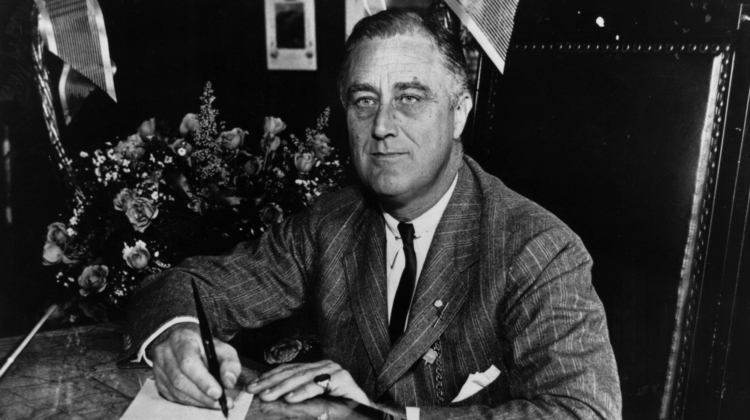The Democrats’ Messiah of Equity
The class-warfare election of 1932.

|
Getting your Trinity Audio player ready...
|
The enduring hero of the modern Democrat Party, Franklin D. Roosevelt had the good fortune to become the party’s nominee for president at a time when the nation was suffering its worst fortunes. He had built a solid reputation as a “progressive” as governor of New York and was a
longtime party regular, having served as assistant secretary of the navy in the Woodrow Wilson administration and as the party’s candidate for vice president in 1920.
The Democrats lost big that year, but nine years later, the Great Depression began, giving them their big opportunity. During that time of nationwide misery, Roosevelt had a legendarily sunny personality and an inspiring personal story. He had battled back from polio to continue his political career despite being confined to a wheelchair. This was widely known although he took pains never to be photographed in the chair and wore heavy metal braces on his legs to give occasional speeches while standing. His tenacity, perseverance, and optimism made him a symbol of what Americans could accomplish if they put their minds to it.
At the Democratic National Convention, Roosevelt won the nomination on the fourth ballot after overcoming weak and halfhearted opposition from the 1928 candidate, Al Smith, and John Nance Garner, who became Roosevelt’s first vice president. Roosevelt broke with tradition and appeared at the convention in person, entering while the band played “Happy Days Are Here Again.” Leftism, optimism, and success were being fused together in the American mind.
In his acceptance speech, FDR uttered the famous words: “I pledge you, I pledge myself, to a New Deal for the American people.” He sounded messianic “progressive” themes that had been familiar since the days of William Jennings Bryan: “This is more than a political campaign; it is a call to arms! Give me your help, not to win votes alone, but to win this crusade to restore America to its own people.” In reality, he intended to do exactly the opposite.
During the 1932 campaign, Roosevelt made it clear that his crusade was, in part, against American business, which during previous economic downturns had been seen as an
engine of economic recovery. In a major speech on September 23, 1932, he came out against business and for the redistribution of wealth, saying: “A mere builder of more industrial plants, a creator of more railroad systems, an organizer of more corporations, is as likely to be a danger as a help…. Our task now is not discovery or exploitation of natural resources, or necessarily producing more goods. It is the soberer, less dramatic business of administering resources and plants already in hand…of distributing wealth and products more equitably.”
Roosevelt grandly concluded: “The day of enlightened administration has come.” He would not be the last “progressive” president to cast the forced redistribution of wealth and massive expansion of state control as “enlightened.”
The Democrat candidate wasn’t alone in seeing this election as a watershed moment. On October 21, 1932, two and a half weeks before the election, President Herbert Hoover, who was seeking reelection amid an atmosphere of gloom and looming defeat, gave a major speech at Madison Square Garden in New York City, saying: “This campaign is more than a contest between two men. It is more than a contest between two parties. It is a contest between two philosophies of government….The primary conception of this whole American system is not the regimentation of men but the co-operation of free men…. It is founded on a peculiar conception of self-government designed to maintain this equal opportunity to the individual, and through decentralization it brings about and maintains these responsibilities. The centralization of government will undermine responsibilities and will destroy the system.” Well, we know he was right now, don’t we?
Yet Hoover’s grand words were actually hollow: the incumbent president didn’t really offer an alternative to Roosevelt’s program. In fact, his administration was its precursor. Unlike Hoover, however, Roosevelt was popular. With the economy in the tank and a widely hated president running for reelection, Roosevelt was a shoo-in. The campaign was long on ballyhoo and short on genuine substance; it was Tippecanoe and Tyler Too all over again, with a tinge of class warfare. A cigar-store Indian could have beaten Hoover in 1932, and it was a bonus that Roosevelt was much more appealing personally than Hoover. He trounced Hoover with 472 electoral votes to the incumbent’s 59. The New Deal was underway.
It was all very exciting and inspiring, and the American people have been footing the bill for it ever since.

